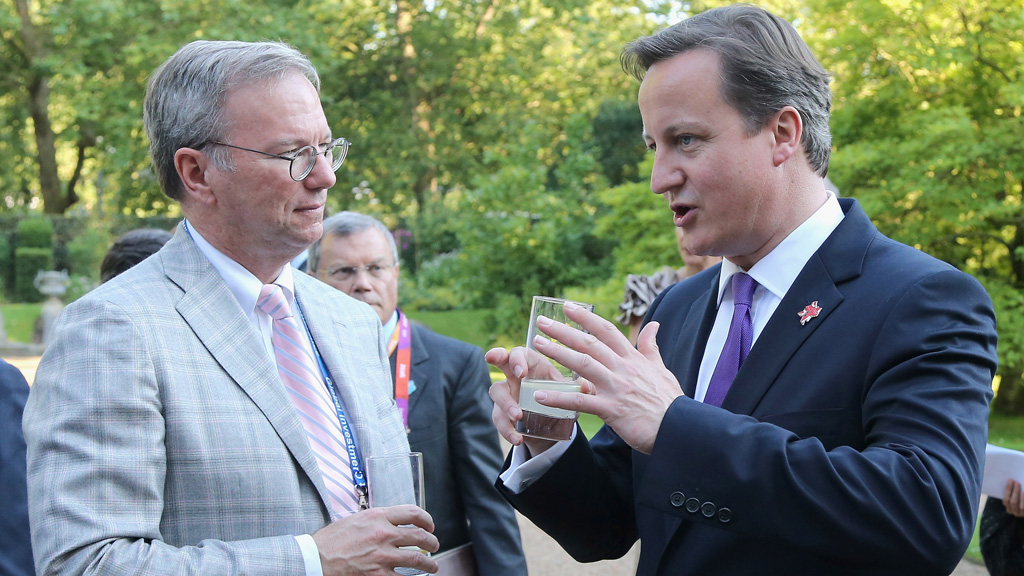Google chief Schmidt at No 10, but not challenged on tax
David Cameron hosts a summit of his business advisory group in Downing Street, but does not raise the issue of tax avoidance with Google executive chairman Eric Schmidt.
- Chapters
- descriptions off, selected
- subtitles off, selected
- captions settings, opens captions settings dialog
- captions off, selected
This is a modal window.
This is a modal window. This modal can be closed by pressing the Escape key or activating the close button.
The business advisory group, a group of business leaders which provides “high level” advice to the government, held its quarterly meeting with the prime minister on Monday.
The meeting follows a public mauling given to Google over its tax affairs, with the chair of the public accounts committee Margaret Hodge saying the company does “evil in using smoke and mirrors to avoid paying tax”.

Google paid just £6m in British corporation tax in 2011, despite revenues of £3bn. Other members of the business advisory group include the chief executives of Tesco, Vodafone, Dyson, BAE Systems and Thomas Cook.
Tax transparency
The main issue addressed by the public accounts committee was how Google bills for advertising sales in Ireland, where there is a significantly lower corporate tax rate, even though a significant proportion of the sales work was reported to have been carried out in the UK.
The prime minister’s official spokesman said on Monday that Mr Cameron would be “taking the group through his G8 agenda. Tax and tax transparency are at the heart of that.”
Read Business Correspondent Siobhan Kennedy's blog post: Google in the hot seat - but HMRC feeling the heat
Asked whether he would raise concerns about Google’s tax arrangements, the spokesman said: “We don’t talk about individuals’ or individual companies’ tax affairs.
“What the prime minister will be doing at that meeting today is explaining the tax transparency part of the G8 agenda which he has been discussing with other G8 leaders and will discuss again at the European Council this week.”
Evasion havens
Mr Cameron has also written to the leaders of British tax havens, stressing the need to “get our own houses in order”.
In a message to 10 crown dependencies and British overseas territories, Mr Cameron said he backed the right to be low tax jurisdictions but insisted that rules needed to be set and enforced fairly.
The prime minister’s letter was sent to leaders in Bermuda, the British Virgin Islands, the Cayman Islands, Gibraltar, Anguilla, Montserrat, the Turks and Caicos Islands Jersey, Guernsey and the Isle of Man.
Mr Cameron wrote: “As you know, I have made fighting the scourge of tax evasion and aggressive tax avoidance a priority for the G8 summit which the UK is hosting next month.
“With one month to go, this is the critical moment to get our own houses in order. I am looking to all the overseas territories and crown dependencies to continue to work in partnership with the UK in taking the lead on two critical issues: tax information exchange and beneficial ownership.”
He told the leaders: “I respect your right to be lower tax jurisdictions. I believe passionately in lower taxes as a vital driver of growth and prosperity for all.
“But lower taxes are only sustainable if what is owed is actually paid – and if the rules to achieve this are set and enforced fairly to create a level playing field right across the world. There is no point in dealing with tax evasion in one country if the problem is simply displaced to another.”